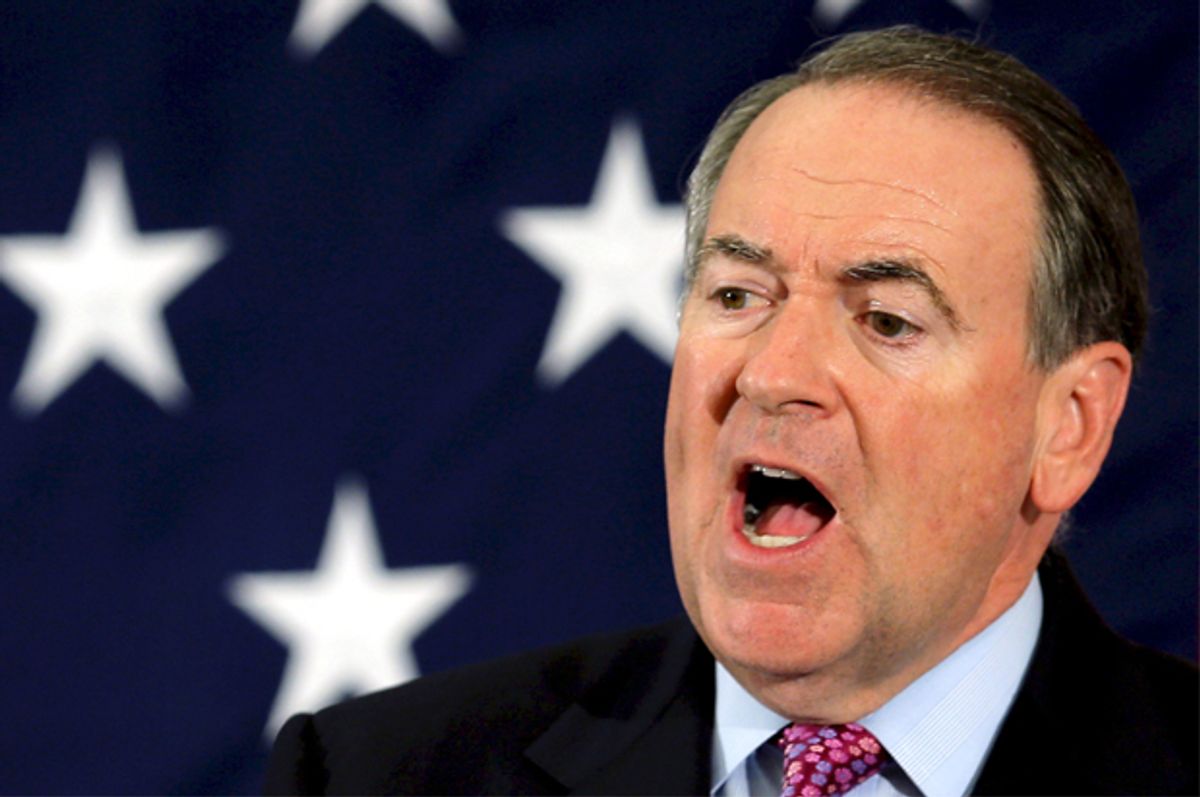Everyone remembers Mike Huckabee as the nice guy of the 2008 race, but he probably had his biggest impact with one perfect zinger: Monied rival Mitt Romney, he quipped, didn’t look like one of the guys you worked with, “he looks like the guy who fired you.” Fast forward to 2012, and Romney’s GOP rivals continued the Huckabee line on the plutocratic Romney, beating up on his employer Bain Capital and its “vulture capitalism” before the Obama campaign had to spend a dollar.
In 2016, Huckabee promises to be far nastier than he was last time around. In his declaration speech on Tuesday, Politico’s Roger Simon cracked, he looked like “an angry beach ball in a suit.” Most of his fire is reserved for the culture war: He’s nastiest when talking about Democrats who think women “can’t control their libidos,” women who in fact indulge their libidos, the gay marriage lobby and Barack Obama. He’s smeared the president as imbibing left-wing values “growing up in Kenya” (he did not) and urged Christians not to enlist in the military until there’s a new commander in chief.
But Huckabee has not abandoned the populist economic rhetoric that got the big-spending former Arkansas governor into trouble with anti-tax conservatives last time around. In fact, he’s learning how to meld populism with homophobia: Crusading against the Trans-Pacific Partnership, Huckabee told MSNBC’s Andrea Mitchell that American workers would “take it in the backside” if the trade deal was approved. And we all know nobody’s supposed to take it in the backside.
Could there be an upside in Huckabee's populist backside politics? Maybe, though he’s still a very long shot for the nomination. Salon’s Jim Newell argues that melding his culture warrior stands with economic populism could give Huckabee a lane of his own in the GOP primary, even if he’s unlikely to win it. Alone among the GOP candidates, he’s committed himself to defending Social Security and Medicare. And now he’s taking on the TPP, when most of his rivals are teaming up behind it with Obama.
So far Huckabee has also shown he’s willing to tweak Jeb Bush personally, where rivals like Scott Walker have been more subtle. “I don’t come from a family dynasty, but a working family,” he’s proclaimed. “I grew up blue collar, and not blue blood.” He’s looking to Romneyize Jeb Bush – before Democrats get around to it.
All the GOP rivals realize that they’re gunning for the support of the white working class. Once a cornerstone of the New Deal coalition, working-class whites moved to the party of Richard Nixon and Ronald Reagan, then came back briefly to the Democrats thanks to Bill Clinton. Obama lost ground with the group, for reasons of culture and race, and Hillary Clinton isn’t likely to make up much of it – she’s cast her lot with the “rising American electorate” of young people, non-whites and unmarried white women.
But only Huckabee, among Republicans, is trying to craft an economic pitch that might appeal to this new cornerstone of the GOP. Everyone else is hoping that warmed-over Reaganism, blaming the poor for their poverty and assorted dog whistles will do the trick, even as Republicans remain the party of the top 1 percent.
Yes, Huckabee is now a 1 percenter who’s posing as a working stiff. And he still seems more likely to play to his base’s old-fashioned homophobia than their fear of taking it in the backside from the ruling class. Fiscal hawks hate Huckabee the way defense hawks hate Rand Paul – but unlike Paul, he’s mostly stuck to his policies. It may doom him with most wealthy donors, and anti-spending conservatives.
On Wednesday Huckabee 2008 loyalist Steve Deace slammed Huckabee's stands on Medicare and Social Security, denouncing the programs are "not safety nets" but "the basis for a permanent welfare state." Deace said Hillary Clinton could have made the same stance.
Still, Huckabee will get a hearing in debates. And in a crowded field in which the GOP rivals “me, too” one another with their zombie Reaganism, Huckabee could get attention from working-class whites worried about their own future.



Shares